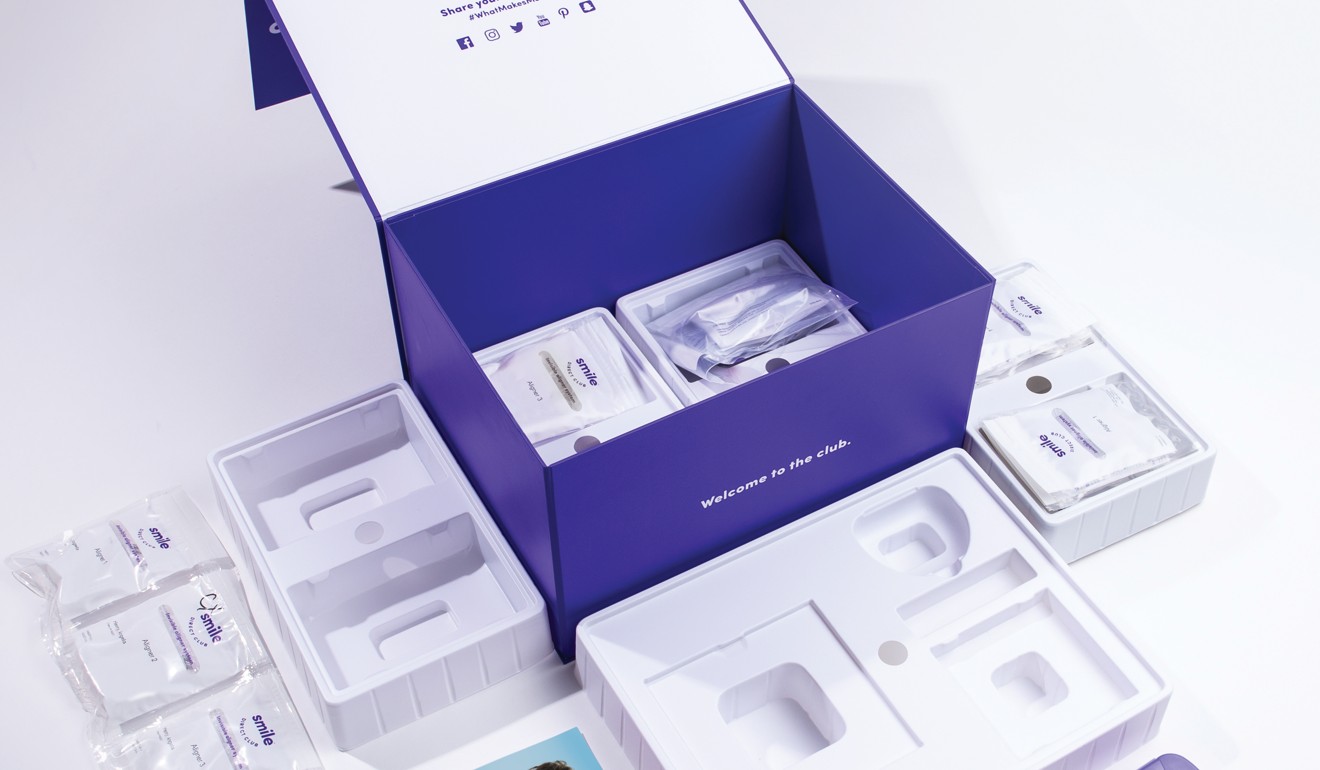
What’s the price of a perfect smile? US teeth-straightening start-up SmileDirectClub aims to shake up Hong Kong’s dental industry with its online solution
- The company claims its 3D-printed plastic aligners will sort out your wonky teeth for a minimum of HK$14,500 (US$1,870) – and you don’t have to visit a dentist
- Some local experts warn that clients are taking a risk because the overseas orthodontists in charge of their treatment are not regulated in Hong Kong

They say a smile costs nothing. But it seems a truly winning grin, revealing a set of gleaming, perfectly aligned teeth, can come with a hefty price tag.
SmileDirectClub, the latest American start-up to try to “disrupt” Hong Kong’s orthodontics industry, claims its 3D-printed plastic aligners will sort out your wonky gnashers for a minimum of HK$14,500 (US$1,870) – and you don’t even have to visit a dentist.
But such practices, in which a customer’s prescription and follow-up treatment is largely done over the internet, are not without their critics. Some local experts warned that clients are taking a risk because the overseas orthodontists in charge of their treatment are not regulated in Hong Kong.
Customers can order a DIY kit from SmileDirectClub’s website to make an impression of their teeth which they then send back to the company’s US office. Alternatively, they can visit one of two outlets the company recently opened in Hong Kong to have their teeth scanned to create a 3D image.
Either way, the images are then reviewed by a Canada-licensed dentist, who will prescribe a straightening programme within 48 hours, having determined that the customer is suitable for treatment.

Clear, plastic aligners made by 3D printing machines at SmileDirectClub’s Tennessee factory are shipped to the client within four weeks. No subsequent visit to a dentist is needed, the company claims, and progress reviews are carried out by online licensed dentists at least every 90 days.
The five year-old firm, which raised some US$1.3 billion from a Nasdaq stock market listing in September, opened its two outlets in Hong Kong last month – its first expansion into the Asian market after entering Canada, Australia, New Zealand, Britain and Ireland in the past 14 months.
“Hong Kong consumers’ sentiment toward beauty and aesthetics is very positive [for our business],” said Kay Oswald, the company’s international president.
The company is backed by online direct-to-consumer ventures investor Camelot Venture Group.
SmileDirectClub’s competitors include New York-based Candid, Utah-based Smilelove and Washington state-based Snapcorrect. Smilelove has six dental “scan centres” in Hong Kong.
Removable, clear plastic aligners are nothing new. They were made popular two decades ago by California-based Align Technology’s Invisalign product distributed through dentists’ clinics.
Align Technology, which claims to have served 6.8 million customers with Invisalign, operates differently.
Its tooth aligner is distributed through dentists and orthodontists in Hong Kong, who must go through its own training programme. They retain full control and responsibility for their treatment decisions and set their own prices.
The average treatment for an adult lasts 12 to 18 months, Align said, compared to six months touted by SmileDirectClub, which said its product suits “mild to moderate” misalignment cases only.
Invisalign said its products require check-ups at dentist offices every six to eight weeks, versus every three to four weeks for metal braces.
SmileDirectClub said its dentists and orthodontists are “not practising dentistry in Hong Kong.”
This has raised some concerns among local dental experts.
“It is similar to people buying prescription drugs from overseas websites, which are not regulated by the Hong Kong authorities,” said a Kowloon-based orthodontist who declined to be named.
The presence of an undetected, underlying dental disease could result in a compromised result, permanent damage or loss of teeth, the Hong Kong Society of Orthodontists says of “do-it-yourself” braces on its website.
“The public should not only consider the price or convenience,” it said in a joint statement with the Hong Kong Dental Association.
Asked about such concerns, SmileDirectClub’s spokesman said customers must have visited a dentist for a regular check-up within the six months before receiving its treatment. If clinical issues arise during the treatment, they are encouraged to see a regular dentist.
SmileDirectClub’s orthodontists may request additional diagnostic information such as bone imaging, photos of teeth, periodontal screenings, or X-rays before prescribing treatment.
Consumers are responsible for the costs of any check-ups or treatments carried out at regular dental clinics, and there is a formal complaints procedure. Less than 5 per cent of its 750,000 customers have received a refund, the spokesman said.